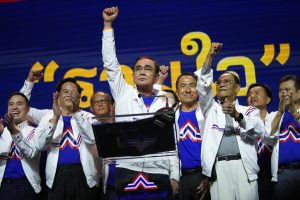Late last week, Thailand’s Prime Minister Prayuth Chan-ocha said that he was considering an early dissolution of parliament, which will pave the way for the national elections expected in early May. Speaking to reporters on Thursday, the Thai leader did not reveal the date, but said that it would come before the end of the government’s term ends on March 23.
“I have a date in mind already,” he said, according to a Thai media report. “I still need to make a final decision and some preparations.”
Prayut was speaking to reporters at the end of the two-day debate in the Thai parliament, during which he received a grilling from opposition parliamentarians over alleged mismanagement, nepotism, and toleration of corruption – a preview of the potentially bitter electoral campaigning to come.
Prayut’s comment offers only a minor degree of clarity about when exactly Thailand’s election will be held. According to the constitution, it has to be held sometime in May. While an early dissolution of parliament wouldn’t change the voting day by much, it could have implications for the poll, allowing for the recruitment of more party members prior to the campaign. Under the country’s election rules, Reuters reports, early dissolution would reduce the minimum period of party membership for election candidates from 90 days to 30 days.
This would be of particular benefit to Prayut, who last month joined the new United Thai Nation (UTN) party, which is hoping to attract defectors from a range of other parties, including the ruling military-backed Palang Pracharath Party (PPRP). Not that it will necessarily make much difference: a recent poll found that the UTN was only the sixth-most preferred party, commanding the support of just under 5 percent of respondents.
In a broader sense, this year’s election is shaping up as a familiar battle between the military-royalist establishment, and the opposition movement associated with ousted former Prime Minister Thaksin Shinawatra – but with a few added wrinkles to the plot.
On the side of the establishment, the election picture is muddied by the recent divisions within the PPRP. Prayut was elected prime minister under its banner at the last general election in 2019, nearly five years after seizing power in a military coup. But Prayut left the party for the UTN late last year, after reported tensions with the PPRP’s leader, Deputy Prime Minister (and deputy coup leader) Prawit Wongsuwon, 77, with whom he will now go head-to-head at the upcoming election.
On the opposition side, the picture appears more or less as it did in 2019. The emergence of a youth-oriented Move Forward Party, an avatar of the Future Forward Party that came in third in the 2019 election and was then banned in early 2020 for being too popular, once again stands as a competitor for (and possible collaborator of) the Pheu Thai Party. The latter party will be led into the election by Thaksin’s 36-year-old daughter Paetongtarn Shinawatra, who says she is hoping to tap into the nostalgia for past eras of Thaksinite rule, and to implement an agenda that was interrupted by coups in 2006 and 2014.
Given the fragmented landscape on both sides of the political divide, there is a good chance that the election will see drama accompany the formation of a governing coalition – even possibly one that reaches across the deep establishment-opposition divide.

































